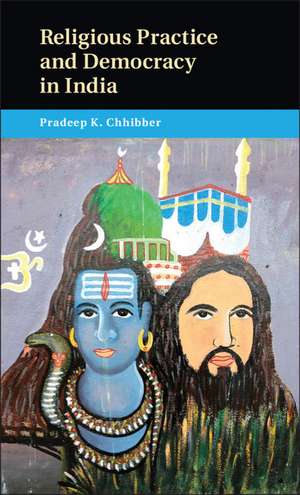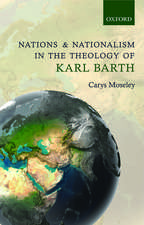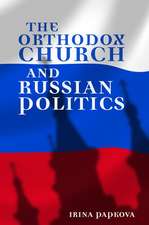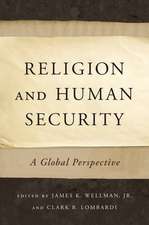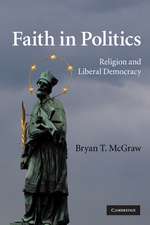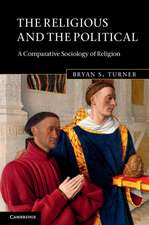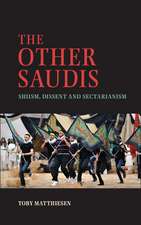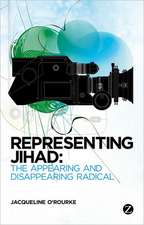Religious Practice and Democracy in India
Autor Pradeep K. Chhibberen Limba Engleză Hardback – 16 iul 2014
Preț: 785.01 lei
Preț vechi: 912.81 lei
-14% Nou
Puncte Express: 1178
Preț estimativ în valută:
150.23€ • 156.26$ • 124.02£
150.23€ • 156.26$ • 124.02£
Carte tipărită la comandă
Livrare economică 14-28 aprilie
Preluare comenzi: 021 569.72.76
Specificații
ISBN-13: 9781107041509
ISBN-10: 1107041503
Pagini: 218
Ilustrații: 41 b/w illus. 6 tables
Dimensiuni: 140 x 216 x 14 mm
Greutate: 0.4 kg
Ediția:New.
Editura: Cambridge University Press
Colecția Cambridge University Press
Locul publicării:New York, United States
ISBN-10: 1107041503
Pagini: 218
Ilustrații: 41 b/w illus. 6 tables
Dimensiuni: 140 x 216 x 14 mm
Greutate: 0.4 kg
Ediția:New.
Editura: Cambridge University Press
Colecția Cambridge University Press
Locul publicării:New York, United States
Cuprins
1. Religious practices, identities, and political representation; 2. The influence of religious practice; 3. Social domination: caste and political representation; 4. Avenues for the connected: civic associations; 5. Political institutions and the reproduction of inequalities; 6. Party competition, social divisions, and representation; 7. Conclusion.
Recenzii
'On the basis of several surveys, Pradeep Chhibber argues counterintuitively that the more they practice a religion, the more Indians support democracy. This correlation largely stems from the fact that 'ties created through religious practice build sympathetic ties between representatives and citizens'. Religious ties, indeed, foster horizontal bonds at the expense of the hierarchical arrangement of society. The correlative erosion of caste and other intermediate bodies may also result in Hindu majoritarianism. Chhibber very pertinently admits that ethnio-religious ideologies are the greatest danger for democracy in India. This book is most topical indeed.' Christophe Jaffrelot, CERI-Sciences Po/CNRS and King's India Institute, London
'This is a path-breaking book. There are few empirical studies of the relationship between transformation of religion and democracy. This book is a subtle and powerful examination of this relationship. It will unsettle many entrenched assumptions about both religious practice and democracy. The book will provoke a lot of discussion.' Pratap Bhanu Mehta, President and Chief Executive, Centre for Policy Research, New Delhi
'Political science can and should study the impact of religion on politics. This important book clearly articulates, and brilliantly demonstrates, how and why in India, high religious practice, more than caste, civil society, or parties, is the most significant variable associated with Indian citizens' positive sense of political representation.' Alfred Stepan, Wallace S. Sayre Professor of Government and Director, Center for the Study of Democracy, Toleration and Religion, Columbia University
'In a highly original way, this book connects religious practice (not religious doctrine) and democracy in India. Religious practice in India does not show equality, as it is commonly understood. Rather, it creates a shared identity. In most sites of religious practice, if not all, the hierarchical social distinctions characteristic of India disappear, and the rich and the poor, the high and the low, 'find themselves in the same position vis-à-vis the divine'. Because religious practice is ubiquitous in India, and because survey evidence shows that the religious believe in democracy more than the non-religious, India's democracy, argues Chhibber, can be said to rest on the foundation of religious practice. In effect, in a deeply hierarchical society, religious practice and electoral practice are the only two 'public spheres' where social hierarchy tends to disappear. There is an affinity between the two spheres. This argument will touch off a new and vigorous debate about religion and democracy, both in India and elsewhere.' Ashutosh Varshney, Sol Goldman Professor of International Studies and the Social Sciences, Brown University, Rhode Island
'This book offers a helpful corrective to the long-standing beliefs that all aspects of religion contribute to authoritarianism and that only modern (Western) associations nourish democracy.' J. G. Everett, Choice Connect
'This is a path-breaking book. There are few empirical studies of the relationship between transformation of religion and democracy. This book is a subtle and powerful examination of this relationship. It will unsettle many entrenched assumptions about both religious practice and democracy. The book will provoke a lot of discussion.' Pratap Bhanu Mehta, President and Chief Executive, Centre for Policy Research, New Delhi
'Political science can and should study the impact of religion on politics. This important book clearly articulates, and brilliantly demonstrates, how and why in India, high religious practice, more than caste, civil society, or parties, is the most significant variable associated with Indian citizens' positive sense of political representation.' Alfred Stepan, Wallace S. Sayre Professor of Government and Director, Center for the Study of Democracy, Toleration and Religion, Columbia University
'In a highly original way, this book connects religious practice (not religious doctrine) and democracy in India. Religious practice in India does not show equality, as it is commonly understood. Rather, it creates a shared identity. In most sites of religious practice, if not all, the hierarchical social distinctions characteristic of India disappear, and the rich and the poor, the high and the low, 'find themselves in the same position vis-à-vis the divine'. Because religious practice is ubiquitous in India, and because survey evidence shows that the religious believe in democracy more than the non-religious, India's democracy, argues Chhibber, can be said to rest on the foundation of religious practice. In effect, in a deeply hierarchical society, religious practice and electoral practice are the only two 'public spheres' where social hierarchy tends to disappear. There is an affinity between the two spheres. This argument will touch off a new and vigorous debate about religion and democracy, both in India and elsewhere.' Ashutosh Varshney, Sol Goldman Professor of International Studies and the Social Sciences, Brown University, Rhode Island
'This book offers a helpful corrective to the long-standing beliefs that all aspects of religion contribute to authoritarianism and that only modern (Western) associations nourish democracy.' J. G. Everett, Choice Connect
Notă biografică
Descriere
This book demonstrates the close relationship between religion and democracy in India.
